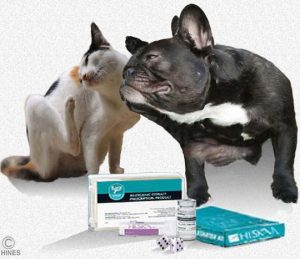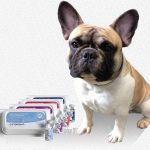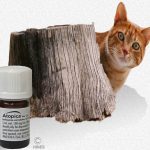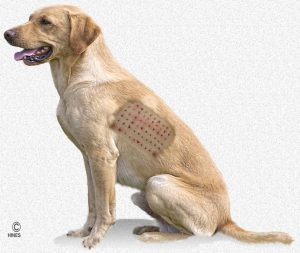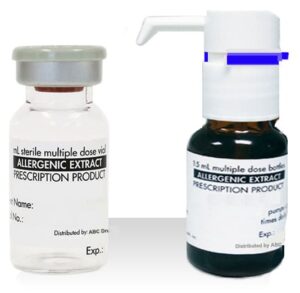Should My Vet Test My Dog And Cat For Allergies?
Ron Hines DVM PhD
 NexGard®, Bravecto®, Simparica®?
NexGard®, Bravecto®, Simparica®?
Skin allergies and itching (atopy) are the second most common reason pet owners bring their dogs to veterinarians. Ear infections are the 1st. And if you consider that ear infections and hot spots are often due to underlying allergies, allergic problems are the number one reason dogs come in for a visit. Cats are not as prone to allergies. It’s the 7th most common complaint from cat-owning clients.
I live with my allergic Labradors retriever, Maxx. So, I am on both the giving and the receiving end of my own advice. When you are dealing with allergic pets, you have a limited number of imperfect options: You can treat your pet with soothing lotions and shampoos. You can give them medications that suppress their immune system (e.g. corticosteroids, Atopica®, Apoquel® or Cytopoint®) or you can attempt to have the things your pet is allergic to identified and see if periodic allergy shots and/or avoidance might help (= hyposensitization=desensitization injections). Your veterinarian will send you home with other things – antibiotics, fatty acid supplements, antihistamines, tranquilizers, special diets, etc. All of those products are helpful. But many are time-consuming and often give less than spectacular results. In dogs and in cats, as in humans, inhaled and contact allergy problems run in families.
Skin Tests To Find Out The Things My Dog Or Cat Is Allergic To?
Most dog and cat owners already know about the potent side effects of long-term use of drugs such as steroids, Atopica® (= cyclosporin) and Apoquel®. So, allergy testing, and then periodic desensitization shots or attempted avoidance, can be quite appealing. It is certainly a procedure with little or no downside – other than the expense and time involved. Human dermatologists often claim ~ 85% improvement after an extended period of desensitization shots. However, in one hay fever study, only 38-54% of patients noticed a marked improvement. (read here) In another study regarding allergic asthma, even less. (read here) Others found “marginal benefits”. (read here) Unfortunately, almost all published studies on the effectiveness of desensitization shots or oral desensitization antigen drops in animals and humans are industry-financed or industry-generated.
So, how effective allergy shots really are in dogs and cats remains unknown. A veterinary dermatologist at the veterinary school in Illinois claims a 60-80% success rate in dogs, with the best chances of success being in younger pets. However, veterinarians with the Veterinary Information Network believe that approximately half of the dogs receiving immunotherapy will have an excellent response, about 25 percent will have a so-so response and about 25 percent will not show any benefits at all. (see here) These tests appear to be even less accurate in identifying allergies in cats. (read here) For both cats and dogs, skin tests are not an accurate way to detect food allergies. For that, elimination diets that lack various meats or that have been processed to become less antigenic (less able to cause allergies) are the way to go.
Skin testing is a time-honored procedure in which a small amounts of the things (allergens) that dogs and cats commonly become allergic to (e.g. grasses, pollens, molds, dust mites, storage mites, flea saliva, etc.) are injected or scratched into the deeper layers of your pet’s skin. It is a time-consuming procedure. Results can also “straddle the fence” and be quite difficult to interpret. So, it is best that you have these tests performed by an experienced, board certified veterinary dermatologist. We call this an in vivo test because it duplicates (as best we can) the things that happen in allergic dogs and cats when they inhale or come in contact with an offending allergen. All the resources and defenses that your pet’s immune system would use to destroy the particular antigen(s) (e.g. degranulation) come into play after the test panel shots are given. In that process, redness and swelling at the injection sites represent a positive test result. Most dermatology experts believe that skin test panels such as I just described are the only accurate method of detecting allergies with any confidence (the closest thing we have to a “gold standard”).
Pet skin testing only requires mild sedation. However, there are veterinarians who believe that certain sedatives might affect the test results, making positives or negatives more likely. (read here) A patch of hair will be shaven from your pet’s rib cage area, and a patchwork of needle injections will deposit small samples of the most common offending allergens in your area into your pet’s skin. When it is finished, your pet might look like the imaginary dog in the photo above.
In vitro substitute tests in which your local vet just takes a blood sample from your dog or cat and sends it off to a commercial laboratory are considerably less expensive and time-consuming. However, they are considered by most human and veterinary dermatologists to be considerably less accurate. I get to that next:
What About Blood-based Allergy Tests Available At My Local Animal Hospital?
As I mentioned before, it is my opinion that skin tests, although not 100% accurate in determining what your pet might be allergic to, are considerably more likely to be accurate than blood tests. But because of the expense and specialized training needed to perform and interpret skin tests, veterinarians, veterinary conglomerates and veterinary pharmaceutical companies are always on the lookout for simpler and cheaper alternatives – ones that ordinary veterinarians can perform in their offices without the need of a trained specialist and the possible loss of their clients. These blood-based antibody tests have come on the market several times, in the past. Currently, Heska Corporation markets their Allercept® blood IgE allergy test (along with custom prepared desensitization shots or oral desensitization drops based on the results)  . The VCA animal hospital chain, a division of the Mars Conglomerate markets their own
. The VCA animal hospital chain, a division of the Mars Conglomerate markets their own  . Idexx Laboratories sells their version too
. Idexx Laboratories sells their version too 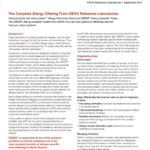 . All rely on detecting the presence of antibodies called IgE that allergic pets produce against things they have become allergic to. There are approximately 500 different allergen substances, perhaps more now, available commercially to test for the presence of individual IgE levels in your dog or cat’s blood. Specific Ig molecule classes are generated in the billions, and each class or clade is different enough from the others (with exceptions) so that it can trigger an allergic response to the specific antigen that prompted its formation. (read here) IgE antibodies are produced by a special group of your dog and cat’s lymphocytes called plasma cells. Some call this their “gatekeeper function”. The itchy inflammatory process in your pet’s skin that is begun by a specific IgE’s presence is extremely complex. It involves many biochemical participants and is still not fully understood.
. All rely on detecting the presence of antibodies called IgE that allergic pets produce against things they have become allergic to. There are approximately 500 different allergen substances, perhaps more now, available commercially to test for the presence of individual IgE levels in your dog or cat’s blood. Specific Ig molecule classes are generated in the billions, and each class or clade is different enough from the others (with exceptions) so that it can trigger an allergic response to the specific antigen that prompted its formation. (read here) IgE antibodies are produced by a special group of your dog and cat’s lymphocytes called plasma cells. Some call this their “gatekeeper function”. The itchy inflammatory process in your pet’s skin that is begun by a specific IgE’s presence is extremely complex. It involves many biochemical participants and is still not fully understood.
As I mention in many of my articles, blood or hair-based allergy testing is close to worthless. At a veterinary symposium last week, a well-known veterinary dermatologist, during his lecture, mentioned that these tests are about 58% accurate – just a bit more accurate than a head’s toss with a penny. He mentioned that another dermatologist submitted a hair sample from a stuffed teddy bear. The reported came back as allergic to beef. Another point he brought up was that dog and cat flavor tabs are often flavored with beef. So, if itching increases just after your pet’s monthly heartworm or flea/tick flavor tab, you might consider changing to a topical product that accomplished the same protection.
Are You Hesitant About The Value Of These Blood Tests?
Yes, that should already be apparent to you. But I am not suggesting that you not have them performed. We all feel better, pet owners and veterinarians alike, when we are comfortable that no stone was left unturned.
I am quite confident that all these tests accurately measure the levels of IgE in your pets’ blood. But it is much less certain that knowing these specific IgE levels will help your pet. In a German study that checked these blood-based allergy tests for accuracy in determining which dogs had food allergies the results were unreliable. (read here). A Louisiana study, determining the accuracy of these test (RAST tests) found them to be highly inaccurate. (read here). An Austrian study found that not only were these test inaccurate, they made mistakes as to which individual IgE class antibodies were directed against. That is because some IgE classes cross-react with several different antigens (CCDs). (read here) Blood-based allergy tests in humans are notoriously inaccurate. For instance, about 1/3 of people with allergies to grass pollen also came out IgE blood test positive for being allergic to peanuts but had negative skin test results for a peanut allergy. (read here). The veterinary school in Queensland, Australia performed a study using the Allercept® test on West Highland Whites. They compared the IgE test results of normal Westies to the results of itchy Westies. They found that normal Westies actually had higher levels of specific IgE than the itchy (Atopic) ones. (read here) A study at the veterinary school in Illinois was equally negative regarding the use of blood allergy tests. Their conclusion was that “the ability to make clinical determinations of significance was marginal”. (read here) An Edinburgh, Scotland study came to a similar conclusion that IgE measurements were valueless – normal, non-itchy dogs has as much circulating IgE as itchy ones. They remarked in their conclusion: that there is a high incidence of positive IgE and intradermal skin test results in non-allergic, normal dogs. (read here)
Cats
Much less is known about allergic cats because cats are considerably less likely than dogs to develop itchy skin allergies. When cats do become sensitive to environmental allergens, it generally affects their lungs rather than their skin. (read here) The only study that I know of that compared the test results of allergic cats to test results of non-allergic cats found no difference between the number of cats that had high specific IgE levels in either group when measured with the Heska Allercept® method. (read here)
What About Blood Tests For Food Allergies?
Most veterinarians believe that the majority of itchy pets with allergic dermatitis (canine & feline atopy) develop their problem due to things they inhale or that come in contact with their skin (such as fleas) – not the things that they eat. But we know that some pets (perhaps 10% ?) do become itchy due to allergies to things in food. (read here) Most of the laboratories that offer blood tests for things like dust mite and flea allergies also offer panels for dog and cat allergies to food ingredients. I believe that those tests are highly inaccurate. Just like the blood panels for inhalant allergies, a negative test result might be of some value in planning your pet’s future diet. But a positive test can as easily be a false-positive as a true-positive. Some studies have found that these tests are really not worth performing. (read here) You have a much better option than blood tests when your pet is itchy or has chronic diarrhea: For two months, put your pet on a test diet and see if it improves. Many pet owners do not wait that long. They make their judgment after a single month. I would have patience and give a test diet a bit longer. You have several options, you can purchase a commercial diet that has been processed to make its ingredients hypoallergenic (the ingredients in them are heated to hydrolyze them) (break the proteins into small units). These are diets like Purina’s H/A™ , Hills Z/D™
, Hills Z/D™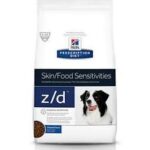 or Royal Canin’s HP™
or Royal Canin’s HP™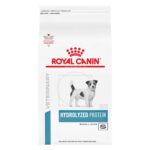 . If any of them are beneficial, you have the option to prepare a diet at home from novel ingredients that your dog or your cat has never eaten before. You will find some suggestions on preparing your pet’s food at home here. I mentioned that certain family lines of dogs and cats are more prone to develop allergies than others. So if you prepare a novel ingredient diet or purchase one that is helpful, there is no guarantee that pets will not eventually become allergic to that new diet as well. That would be the time to again reformulate their diet.
. If any of them are beneficial, you have the option to prepare a diet at home from novel ingredients that your dog or your cat has never eaten before. You will find some suggestions on preparing your pet’s food at home here. I mentioned that certain family lines of dogs and cats are more prone to develop allergies than others. So if you prepare a novel ingredient diet or purchase one that is helpful, there is no guarantee that pets will not eventually become allergic to that new diet as well. That would be the time to again reformulate their diet.
You are on the Vetspace animal health website
Visiting the products that you see displayed on this website help pay the cost of keeping these articles on the Internet.

